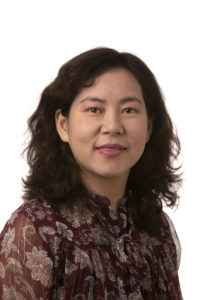Faculty Spotlight – Xiaowei Dong, PhD
August 25, 2020 • Uncategorized
Associate Professor, Pharmaceutical Sciences, and P1 Curriculum Director
Education: PhD in Pharmaceutical Sciences from the University of Kentucky, College of Pharmacy
Hometown: Zigong, China
What led you to your career path?
I got a BS and MS in analytical chemistry. However, I had a passion for healthcare for a long time. So I transferred to the Department of Pharmaceutical Sciences in the College of Pharmacy at the University of Kentucky to pursue my PhD degree in Pharmaceutical Sciences. I found myself loving formulation and drug delivery.
After graduation, I wanted to see how medicines are discovered, developed and commercialized. Thus, I joined the Pharmaceutical and Analytical Department at Novartis Pharmaceuticals Corporation. My work at Novartis Pharmaceutical Corporation as a lead formulator in drug product development gave me valuable insight into the conduct of successful, cost-effective drug formulation development and manufacturing operations. During this period, my work spanned the development stages in pre-clinical studies to Phase III clinical trials.
After 3 years working at Novartis, I wanted to return to academia to focus on research. In 2013, I was blessed to join HSC College of Pharmacy as the inaugural faculty and started my lab, teaching and research at UNTHSC.
What is the focus and significance of your research?
An estimated 40% of approved drugs and nearly 90% of the developmental pipeline drugs consist of poorly water-soluble molecules. Oral administration is the most favorable and preferred route. While I worked at Novartis, all of my projects were related to water-insoluble compounds. Although there were several oral special delivery systems available for water-insoluble compounds, we still faced limited technology options. Without effective drug delivery systems for poorly water-soluble drugs, development of oral formulations of molecules are often abandoned, nevertheless having strong therapeutic potentials. Moreover, many marketed oral drugs have poor water solubility and are commonly associated with low bioavailability and patient variability.
As an expert in lipid nanoparticles, I observed their advantages for drug delivery. However, the big hurdle of using lipid nanoparticles in oral solid dosage forms was low drug loading; that means the final solid form would have a small amount of drug after we convert nanoparticles to solid forms. When I came back to academia in 2013, I dedicated myself to research in this area. In 2015, I discovered in situ self-assembled nanoparticles (ISNP). With this novel nanotechnology, we are able to produce drug solid nanoformulations with high drug loading. We found many special features about this nanotechnology.
Tell us about your recent grant award.
Recently, I was awarded the Maximizing Investigators’ Resource Award (MIRA-R35) from National Institutes of General Medical Sciences at the National Institutes of Health based on this nanotechnology to advance formulation technology for water-insoluble drugs. This is a five-year award to provide support for the research in a principle investigator’s laboratory, not for a single project or disease. This award provides me great stability and flexibility. I am so happy that I can spend my time on doing actual research.
What other research are you working on in your lab?
The ISNP nanotechnology is the main focus in my lab now. Because my research is about formulation technology, I can use it for different drugs to treat different diseases. Currently, I collaborate with other researchers on the treatments of lung disease, cancers and diabetes.
What do you love most about your work?
Research on formulation and drug delivery is really creative. We need to customize each formulation according to the properties of one particular drug. So this research is also very challenging because we have to constantly change compositions, technology and procedures to provide the best formulation for one drug. This research is also very cool. When we discover one novel composition or technology, we can name it by ourselves. For example, I named my new technology as “ISNP”. I use this name for my publications and patent applications.
What do you enjoy doing in your free time?
I like to cook different kinds of food. Sometimes I cook Indian food, sometimes American food and sometimes Italian food. I have good skills in baking. During Chinese Moon Festival, I bake moon cake by myself and share with my friends. I also bake cookies and cakes. Some colleagues in our College of Pharmacy have tasted my moon cakes and cakes. Recently, I had success on a soufflé. That is yummy!


Social media